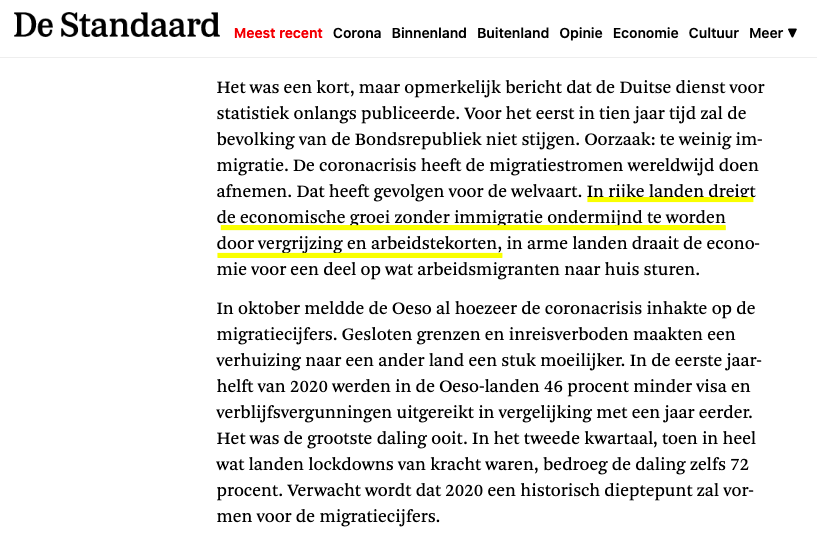“The corona crisis has reduced migration flows worldwide. That has implications for prosperity. In rich countries, economic growth without immigration risks being undermined.” This claim from the German statistical bureau Destatis, published in Belgian newspaper De Standaard from 10 February 2021, turns out to be mostly true.
Immigration is a global phenomenon with Europe as the largest reception area for international migrants according to the United Nations International Migration Report. There where major refugee crises in recent years, which has given the word migration a rather negative undertone. Yet migration has a positive impact on all the countries of Europe. “The claim is correct in theory”, says Ive Marx professor of socio-economics at the Antwerp University (UA). “Immigration does provide a boost in the economy. On the other hand, in practice it is much more complicated. There are many different immigrants. The ones that make a difference to our economy are mainly the migrant workers.”

A United Nations report states, “If supported by appropriate policies, international migration can contribute to inclusive and sustainable economic growth and development.” The National Bank of Belgium‘s results are also positive: “Recent immigration has had a positive impact on gross domestic product. GDP has increased by 3.5% in Belgium. 2% of this is because of the EU migrants and the other 1.5% is due to non-EU migrants.” Here we have to keep in mind that according to the National Bank, Belgium performs very poorly in receiving and employing migrants. It can be concluded from this that European countries that perform best also have a larger increase.
Clear effects
Many of these migrant workers are already being trained in their countries to do bottleneck jobs in other countries. This is called the GSP project or Global Skill Partnership that Belgium is participating in according to Enabel, a Belgian development agency. This provides a higher level of education allowing recent migrants to contribute more, says the ecorev report from the National Bank of Belgium. Second-generation migrants also contribute more to the economy than first-generation migrants. This has to do with education but also with language skills.
Ive Marx: “Corona has a surprisingly small impact on labour migration within Europe. Outside Europe it is more difficult to determine because of the difficult vaccination there.” COVIVAT, a collaboration between three socio-economic research groups from Belgian universities, comes up with the same conclusion: “Migratory movements from non-EU countries are therefore expected to have been harder hit than migratory movements from EU countries.” They also clearly state that they can only see clear effects of the COVID-19 crisis later.
Conclusion
After reports from the National Bank of Belgium, COVIVAT, the United Nations and the insights of Ive Marx, we can conclude that immigration does indeed have an impact on the economic growth of a country. In rich countries, immigrants are used skillfully, by employing them in bottleneck occupations. Yet, according to Marx, the claim is too general because the impact on the economy depends on what kind of migrants migrate.
RESEARCH | ARTICLE © Pauline De Mulder, Janne Genar and Sofie Verbeeck, AP University College, Antwerp, Belgium
Leave your comments, thoughts and suggestions in the box below. Take note: your response is moderated.





